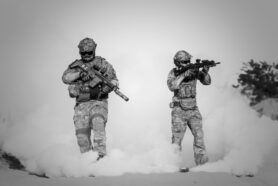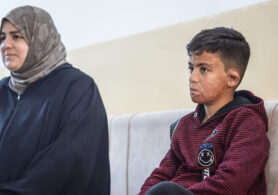This episode of The Civilian Protection Podcast created by CIVIC and PAX focuses on the legacy of civilian harm during 20 years of interventionism in Afghanistan. According to the hosts of this podcast, Garlasco and Shiel, this subject has been missing from the Western news cycle. The hosts indicate that without this critical perspective, we cannot reflect and learn from the US and NATO-led war in Afghanistan. The guest interviewed is Shaharzad Akbar, the chairperson of the Afghanistan Independent Human Rights commission. Akbar grew up in Afghanistan and then as a refugee in Pakistan but went back to Afghanistan to work in the human rights sector. At the time of recording, she is living in exile in Istanbul, Turkey.
The 2001 US-led invasion of Afghanistan began as a reaction to the terror attack on 11 September 2001. The ISAF mission (International Stabilization Force Afghanistan) started in 2001 and ended in 2014, and had at its height 130,000 troops from 51 NATO and partner countries (NATO, 2022). In the podcast, Akbar describes the subsequent shift from boots on the ground to remoteness after 2015 when ISAF reassembled into Resolute Support Mission (RSM). With an average of just 15,000 boots on the ground, RSM’s new focus became to ‘train, advise and assist Afghan security forces and institutions to fight terrorism and secure their country’ (NATO, 2022), and engage in large-scale drone and airstrikes.
Akbar describes: ‘It was a brutal conflict, […] which became more intense when the U.S. and NATO resorted more and more to tactics that would protect their own soldiers […] such as airstrikes’. This created a very unsafe daily reality for the Afghan civilians ‘anything that you could see in the sky could bring death’.
Akbar states that these (drone) strikes often led to civilian casualties because they were based on faulty intelligence. When this happened, there was often no recognition or apology by the US or other NATO countries. According to Akbar ‘There was not even acknowledgement… I remember discussing with my father then, that this would have consequence about how people would view international presence in Afghanistan’ she adds that this led to resentment and anger towards the West. Which we at IRW recognize as a form of blowback.
According to the Cost of War Program, in total an estimated number of 46,319 Afghan civilians have died since 2001. However, the exact numbers are difficult to establish, partly due to NATO’s lack of transparency. The true number of civilian deaths is therefore often believed to be a lot higher.
Akbar describes how hard it was for human rights organisations in Afghanistan to stand up against US and NATO airstrikes and to demand acknowledgment. She attributes this difficulty to the tension caused by these organisations relying on Western countries for their funding. Akbar: ‘by extension, human rights organisations lost credibility in Afghanistan’.
Akbar calls upon NATO to publish all the information they have on airstrikes and civilian harm in Afghanistan. She argues that only if all the information is made public and NATO takes responsibility and is held accountable for the civilian harm done, can Afghanistan start to heal.
This captivating podcast episode provides an Afghan perspective on understanding civilian harm in Afghanistan. This argument is extremely important as it is often missing when we look back at the twenty years of war in Afghanistan.
Written by IRW LAB student Tasniem van Buuren.



